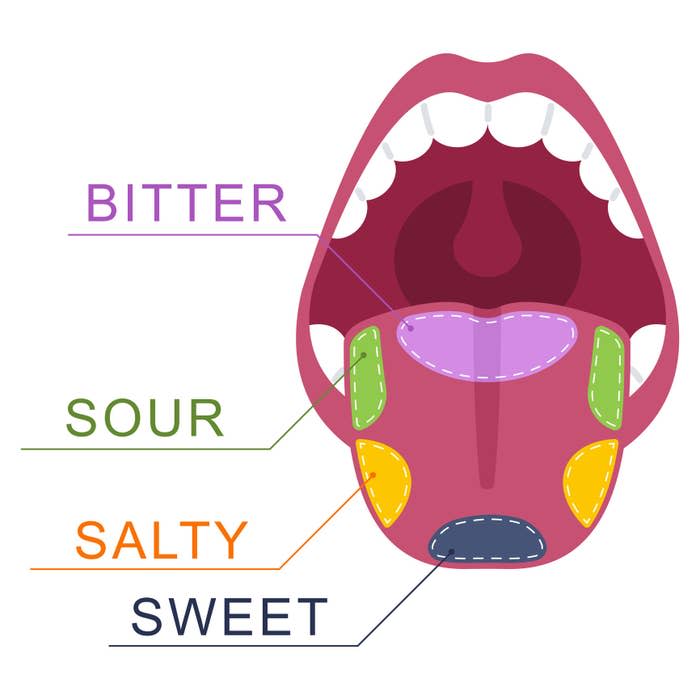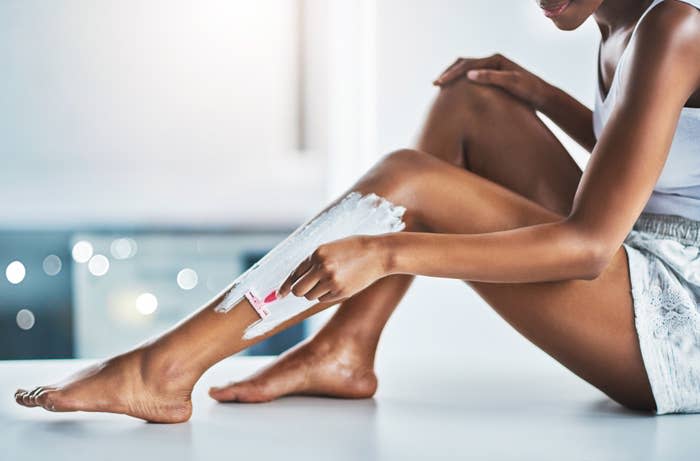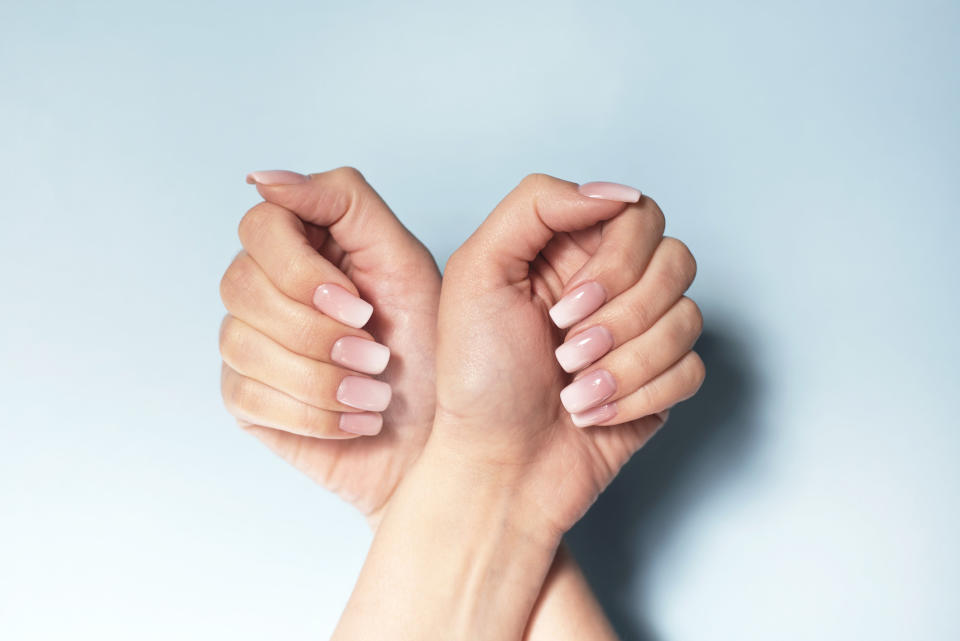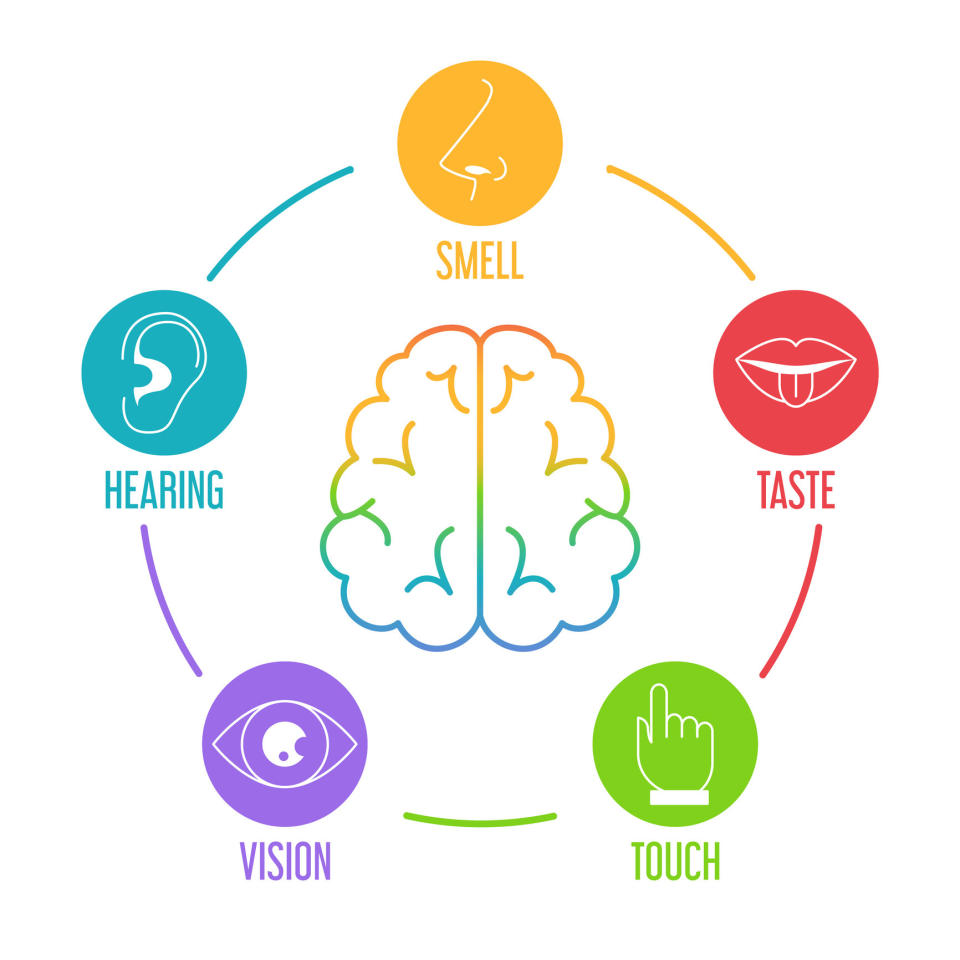16 Myths About The Human Body That You've Seen Over And Over Again, Even Though They're Not True
1.That "tongue map" with specific regions for tasting sweet, salty, sour, and bitter is bogus.

The map probably stems from a 1901 study by German scientist David P. Hänig, who discovered "minute" differences in how strong a taste had to be to register in different parts of the mouth. An illustration accompanying the study misrepresented his findings, and made it seem like "different parts of the tongue were responsible for different tastes." But this has been debunked multiple times, and scientists have found that "all areas of the mouth containing taste buds" are able to detect each taste (including umami, which is now widely accepted along with the original four).
Additionally, molecular biologists have found that specific "receptor proteins" on taste cells can identify individual tastes. Each of these receptors is found throughout the mouth, and not only in their own "section." If the map was accurate, sweet receptors would be concentrated at the tip of the tongue, and bitter ones at the back, but that's not the case.
2.Here's a fun fact to break the ice at parties: Urine is not sterile.
AMC / giphy.com
A long-existing medical assumption was that "patients who test positive for bacteria in their urine have urinary tract disorders." But scientists at Loyola University discovered in a 2014 study that this isn't necessarily true, and confirmed their findings (i.e., bacteria in the urine of women who didn't have any sort of infection) in a 2015 follow-up. Different types of bacteria may indicate different types of medical conditions, allowing doctors to develop more targeted treatments. To sum up, the bacteria found in your pee may be harmless, or present only in small amounts, but it's there.
3.Shaving your body hair won't make it grow back thicker or darker.

You may think you notice a change in the "thickness, color, or rate of growth" of your hair because shaving gives the follicle a "blunt tip," rather than the tapered one that uncut hair has. This may feel or look rougher and darker than what you're used to. But in reality, it's neither, only a trick of perception, and once your hair grows in again, it will be the same as it was before you cut it (unless there is another underlying health issue).
4.Fingernails and hair don't continue to grow after death.

This is another myth based in drawing a false conclusion from appearances. While the nails and hair on a corpse may seem like they've continued growing, what you're really seeing is the "skin around them retract[ing] as it becomes dehydrated, making them appear longer." Some funeral directors may even "moisturize the fingertips" in order to counteract this unsettling effect.
5.Swallowed chewing gum doesn't stick around in your digestive system for seven years.
sofinco / giphy.com
While the gum itself is "pretty immune to the digestive process," that doesn't mean it takes the "normal housekeeping waves in the digestive tract" multiple years to dispose of it. Pediatric gastroenterologist Dr. David Milov pointed out that if gum truly did get stuck in the body, it would show up on procedures like colonoscopies and capsule endoscopy procedures, but it very rarely does. And if a doctor does spot some, it usually hasn't been there for more than a week. The digestive system may not be able to break gum down, but it's pretty good at getting rid of it, and it's unclear where the seven-year story originated. But "large amounts of swallowed gum combined with constipation" have caused medical issues in children, so you should probably just spit it out when you're done with it, anyway.
6.Cracking your knuckles won't increase your chances of developing arthritis.
Nickelodeon / giphy.com
Studies comparing "rates of hand arthritis among habitual knuckle-crackers and people who didn't crack their knuckles" found no connection between the two. And if you already have arthritis, cracking your knuckles won't make it worse. But constantly cracking your knuckles can result in "reduced grip strength," and it's possible to injure yourself while attempting to get that satisfying popping sound (which is caused by "bubbles bursting" in the "fluid that helps lubricate joints," or synovial fluid).
7.Detox teas don't actually flush toxins out of your body (and detox outside of the context of "medical treatment of people with life-threatening drug addictions" is pretty much a myth).

Here's how Edzard Ernst, a professor of medicine at Exeter University, put it while being interviewed by the Guardian in 2014: "The healthy body has kidneys, a liver, skin, even lungs that are detoxifying as we speak. There is no known way — certainly not through detox treatments — to make something that works perfectly well in a healthy body work better." In other words, human bodies detoxify on their own, and do it quite well, or else we'd all be dead. Detox products are often purposefully vague on which toxins, exactly, they're able to target, most likely because naming them would mean "they could be measured before and after treatment to test effectiveness."
8.Humans have more than five senses.

The idea that sight, taste, smell, touch, and hearing are the only ones stems from Aristotle, who argued that "for every sense, there is a sense organ." We have ears for hearing, a tongue for tasting, eyes for seeing, and so on and so forth. But Aristotle was missing a key sense organ — the vestibular system, aka the "apparatus of the inner ear involved in balance" — and there is some debate as to whether the sense organ rule is applicable to all human senses.
Each sense may not require its own sense organ, but simply "a different kind of sensory receptor." The skin alone has four of these receptors, for "touch, temperature, pain, and proprioception (or body awareness)." And there's yet more debate over how to distinguish the senses from one another. For instance, is the ability to distinguish light from dark a separate sense from being able to see in general? John M. Henshaw, a mechanical engineering professor who wrote A Tour of the Senses: How Your Brain Interprets the World, thinks that humans have nine senses: the original five, plus balance, temperature, proprioception (body awareness), and pain. But, he acknowledges, his list "may be a little longer, or shorter, than yours." However you count them, though, you end up with more than five.
9.Monosodium glutamate (aka MSG) isn't tied to negative health effects, and the so-called "Chinese restaurant syndrome" it supposedly causes is based on nothing more than an unscientific letter written to the New England Journal of Medicine in 1968.

The letter writer, a doctor, complained of "numbness in the back of the neck, weakness, and heart palpitations" following the consumption of Chinese food. He speculated that MSG was causing his symptoms, and everyone ran with that for decades. One flawed study conducted in 1969 "administered MSG via injections and large doses on an empty stomach" and concluded that it was inherently bad for you, despite the fact that that's "not the way people consume MSG in the real world." "Racially charged biases" against Asian cuisine in the United States didn't help clear things up either.
The truth is, MSG is found naturally in many foods, including Parmesan cheese and tomatoes, and unless you're eating a truly massive amount or injecting it, it's perfectly safe (and delicious). Both the Food and Drug Administration and the World Health Organization say so. However, it does suffer from some guilt by association, since MSG "make[s] really terrible food taste really good," so it will often be found in dishes that aren't healthy anyway.
10.You can't get warts by touching a toad or a frog (or any other type of amphibian, for that matter).

This anti-amphibian idea may be based in the fact that both animals can have "warty-looking bumps on their skin," but those are just glands. Common human warts are caused by a virus, specifically the human papillomavirus (HPV).
11.The idea that humans only use 10% of their brain is "so wrong it is almost laughable."
University of California / giphy.com
According to John Henley, a neurologist at the Mayo Clinic, "Evidence would show over a day you use 100% of the brain." Another neurologist, Barry Gordon, says that most of the brain is "active almost all of the time." For instance, even when you're asleep, the frontal cortex (responsible for "higher-level thinking") and the somatosensory areas (which help you "sense your surroundings") are still doing their things. Henley clarified that even when damaged, the brain can compensate for what's missing or malfunctioning; it probably couldn't do that if it was only using a tenth of its power.
12.Not waiting 30 minutes or an hour after eating to go swimming doesn't mean you're going to get a cramp and drown.

The general idea here is that eating a large meal increases the amount of blood flow to the stomach (to aid in the digestion process), as opposed to the muscles, increasing a swimmer's risk of cramping and therefore drowning. But most "recreational swimmers" don't need to worry about it, and even if you do get a cramp, "it'd be extremely unlikely to disable and drown you." That is, unless your meal included alcohol, since studies of drowning cases have shown intoxication to be a common factor. The origin of this myth is unclear, but Snopes.com found that it appeared in a book called Scouting for Boys, which was published in 1908.
13.Humans don't lose a disproportionate amount of body heat through their heads.
NBC / giphy.com
It may feel like you do, because the "face, head, and chest are more sensitive to changes in temperature." But as Rachel Vreeman and Aaron Carroll, two scientists who set out to debunk this myth, put it, if it were accurate, "Humans would be just as cold if they went without a hat as if they went without trousers." It's possible this idea originated with a US military study conducted in the 1950s, where test subjects wearing "Arctic survival suits" were placed in freezing-cold environments. It was found that they lost most of their body heat through their heads...but only because that was the only part of their body their snowsuits didn't cover.
14.Every medical show on TV has been lying to you, because shocking someone in asystole (aka flatline) will not get their heart beating again.
Fox / giphy.com
The flatline represents a "lack of electrical activity in the heart," which is as bad as it sounds. A shock from an automated external defibrillator (AED) wouldn't help a person in asystole; the correct treatment would be CPR to "keep blood and oxygen flowing" and a high dose of adrenaline. But if a person has flat-lined, the heart has "stopped listening to the orders to contract," and chances of survival are low. Instead of starting a stopped heart, a defibrillator is meant to correct "arrhythmia or erratic heartbeat," such as ventricular fibrillation.
15.Waking a sleepwalker won't kill them.
Nickelodeon / giphy.com
Michael Salemi of the California Center for Sleep Disorders noted, "You can startle sleepwalkers, and they can be very disoriented when you wake them up and they can have violent, or confused reactions, but I have not heard of a documented case of someone dying from being woken up." However, the things some sleepwalkers get up to (such as driving or cooking) could put them and others at risk of harm, so "leading a sleepwalker back to bed by the elbow" is probably the best course of action.
16.And finally, rust doesn't give you tetanus.

The relationship between rust and Clostridium tetani, the bacteria that causes tetanus, is "purely correlative, not causative." That is, we associate the two because the bacteria is often found in "soil that’s rich in organic material like manure or dead leaves," which indicate conditions that would also lead to abandoned metal objects rusting. Additionally, the type of puncture wound that you'd get from stepping on a rusty nail creates the perfect "tunnel" through which the bacteria can enter the body and wreak havoc. So, while rust may not equal tetanus, they do hang out in the same circles.
All that being said, always make sure you're up to date on your tetanus vaccinations; you can contract the disease through a variety of both major and minor wounds, and it's fatal in 10% of cases.

